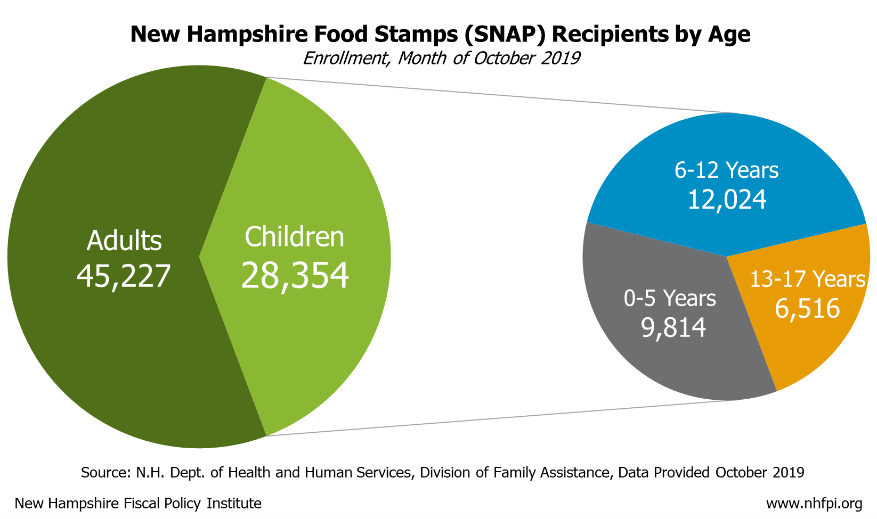As the COVID-19 crisis progresses, the economic impact on many Granite Staters will be intense, with disproportionate effects on individuals and families with lower incomes and limited resources. The financial and economic burdens on those affected demonstrates the importance of nutrition assistance programs as more Granite Staters may struggle to make ends meet. With initial unemployment claims in the first three weeks following the beginning of the crisis exceeding 100,000 in New Hampshire, the need for programs providing nutritional aid has grown dramatically, and will be key as the state continues to move through this crisis.
Before the COVID-19 crisis began, an estimated 41,800 households in New Hampshire were food insecure, meaning that, at that time, households were unable to acquire adequate food for one or more members because of insufficient resources. The largest federal nutrition assistance program, the Supplemental Nutrition Assistance Program (also known as SNAP, or the New Hampshire Food Stamp Program within the state), aided 73,666 Granite Staters during October 2019, of which 28,354 were children. All SNAP benefits are federally funded. During the same time, nearly one in four New Hampshire students enrolled in grades one through twelve were eligible for free and reduced-price school meals. Other programs that provide cash assistance such as aid through Financial Assistance for Needy Families, provided support for thousands more Granite Staters with lower incomes.
Nutrition assistance programs generally require most households to have incomes near those identified in the federal poverty guidelines to be eligible. Programs also generally require beneficiaries to comply with work requirements and regularly recertify, while some additional households may only be eligible if they have children in New Hampshire. In 2020, the federal poverty guideline annual income level is $17,240 for a family of two or $21,720 for a family of three.
With the effects of this crisis likely to disproportionately impact those with lower and more moderate incomes, New Hampshire is likely to experience increased levels of food insecurity among residents. In addition to providing critical nutrition assistance, SNAP and school meal-subsidy programs respond quickly to rapid changes in economic conditions by supporting individuals and families quickly when their incomes decline. Programs providing direct assistance for purchasing food, like SNAP, also help to stimulate the economy. A 2019 analysis from the Economic Research Service of the United States Department of Agriculture estimates that every dollar invested in new SNAP benefits, which are all federally funded, would generate approximately $1.50 in economic activity when the economy is weak. This research also highlights previous analysis by Moody’s Analytics, which found that during early 2009, the multiplier effect of SNAP benefits was even greater, with $1.74 of economic activity generated for every federal dollar invested towards new benefits.
State and federal policy makers have responded to the crisis thus far by adjusting program guidelines and funding during these unprecedented times. Federal legislation has allowed for additional waivers and enhanced funding for states to expand key nutritional programs. In New Hampshire, actions have been taken to help ensure that students who have relied of free or reduced-price meals continue to receive them during this period of remote learning for schools, which will continue through the end of the academic year. These changes allow for students to continue receiving meals via delivery or pickup. Waivers enacted allowing changes to other key nutrition programs, including SNAP, encompass temporary increased benefits to the maximum amount permitted for households, delays in eligibility redetermination, and temporary suspension of the work requirement for certain adults without dependents for 90 days.
As the COVID-19 crisis progresses, the importance of nutrition assistance programs to support residents in need, combat the potential for heightened food insecurity, and stimulate the economy becomes more evident. Modifying certain guidelines for nutritional programs and warranting their continuation throughout the duration of this crisis are key to supporting many individuals and families. However, there are opportunities to help ensure that more Granite Staters who are disadvantaged during these times can access programs for nutritional aid. Additional funding and expansions to eligibility would assist in mitigating food insecurity and contribute to supporting the economic recovery.
– Michael Polizzotti, Policy Analyst

